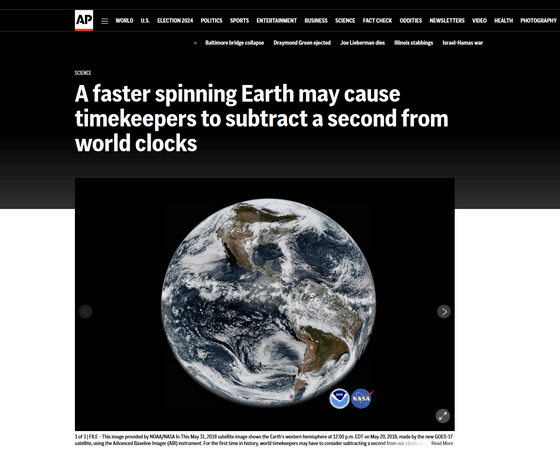As the Earth's rotation becomes faster, there is a high possibility that 'negative leap seconds' will be necessary by 2029, and there is a risk that the Internet and IT services will be disrupted.

It is well known that 'leap years' occur once every four years, when February becomes one day longer, but there are also '
A global timekeeping problem postponed by global warming | Nature
https://www.nature.com/articles/s41586-024-07170-0
A faster spinning Earth may cause timekeepers to subtract a second from world clocks | AP News
https://apnews.com/article/leap-second-subtract-melting-ice-clocks-74eaac47b9c429910723a604897032a4

Why time will stop in 2029: Scientist says a 'negative leap second' will be needed to adjust for Earth's rotation speeding up | Daily Mail Online
◆The Earth has been slowing down for a long time.
According to Duncan Agnew, a physicist at the Scripps Institution of Oceanography at the University of California, San Diego, the Earth has generally slowed down over the past several thousand years. The decrease in rotational speed has been mainly caused by the effect of the ebb and flow of the tides brought about by the moon's gravitational pull, in other words tidal friction .
Even though the speed of rotation changed, there was no visible effect, so it did not become a problem until atomic time was adopted as the official standard time. However, with the advent of ultra-high-precision atomic clocks that define one second as 9,192,631,770 vibrations of a cesium atom, the ``atomic time'' ticked by the atomic clock and the ``astronomical time'' based on the earth's day have become different. As a result of this, a leap second, which is adjusted once every few years by one second, became necessary.
Since leap seconds were introduced in 1972, leap seconds have been added 27 times as the day on Earth gets longer, most recently at 23:00 on December 31, 2016 (January 2017 Japan time). 1 second was added after 59 minutes and 59 seconds of 8 o'clock on the 1st.
Leap second will be inserted at the end of 2016, and December 31st 23:59:60 will be born - GIGAZINE

by woodleywonderworks
◆The trend is accelerating in recent years.
However, in recent years, it has been frequently pointed out that the pace of deceleration is gradually slowing down and, in fact, is accelerating. This is due to multiple factors, but the main reason is that the flow of the hot liquid core at the Earth's core changes in unpredictable ways.
The Earth's core has been accelerating its rotation over the past 50 years since 1972, but this effect has been offset by rapid global warming in recent years. This is because the Earth's polar ice has been melting at a rapid rate since the 1990s, and increased seawater moves from the polar regions to the equator, causing a slowing effect. This is similar to how a spinning skater slows down when he spreads his arms.

◆Leap second schedule postponed due to climate change
In a paper published in the scientific journal Nature in March 2024, Mr. Agnew reported that due to the effects of global warming, the ``negative leap second'' that was needed in 2026 has been delayed by three years to 2029. The results have been announced. It has been decided that leap seconds will be effectively abolished by 2035, so the last leap second may be negative.
Although it may not seem like a big deal whether one second increases or decreases, the impact on modern society, which runs on the precise time ticked by atomic clocks, is enormous. Failures occurred on the bulletin board social news site Reddit, and server systems running on Linux.
Agnew told the media: ``When predicting the future orientation of the Earth, we consider trends in the Earth's core and other related phenomena. , which would require a negative leap second. This would cause unprecedented problems with computer network timing, so you might have to change Universal Time sooner than planned. No,” he said.
The study also shows that climate change can even affect the Earth's rotation, leading Agnew to write a paper that says, ``If polar ice melt hadn't accelerated recently, this problem would have occurred three years earlier.'' In other words, global warming is already having an impact on the world's timekeeping.''
Related Posts:
in Science, Posted by log1l_ks






